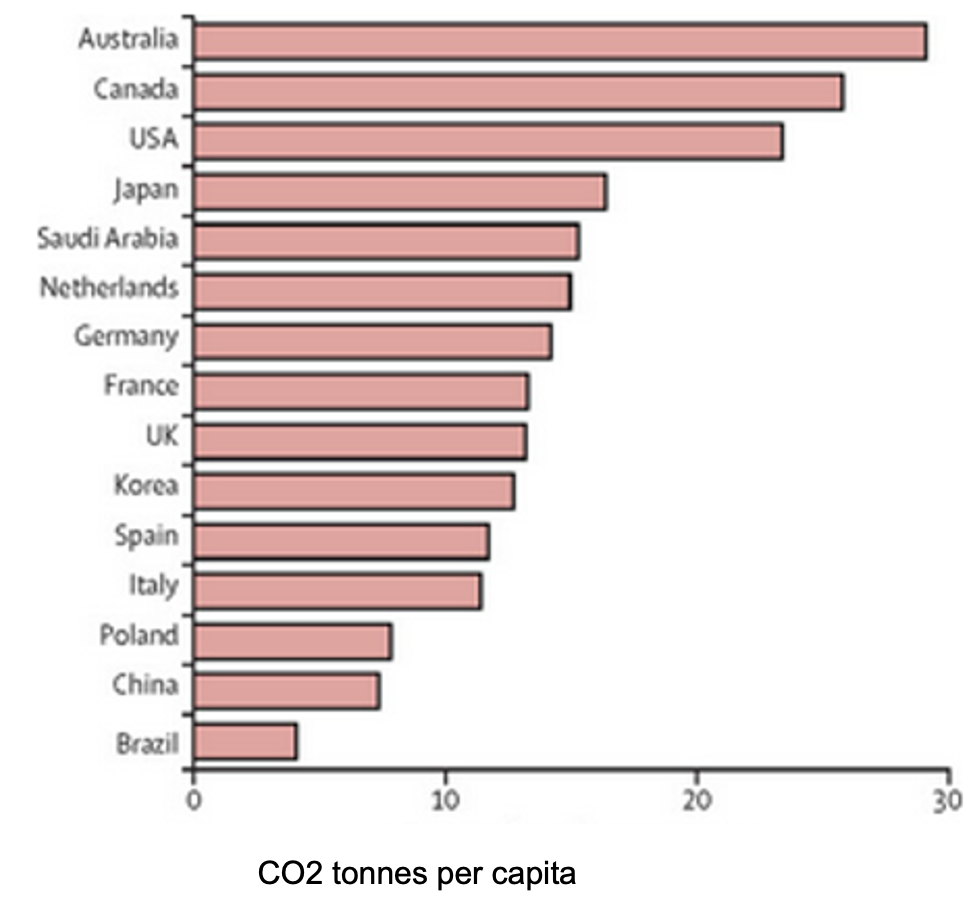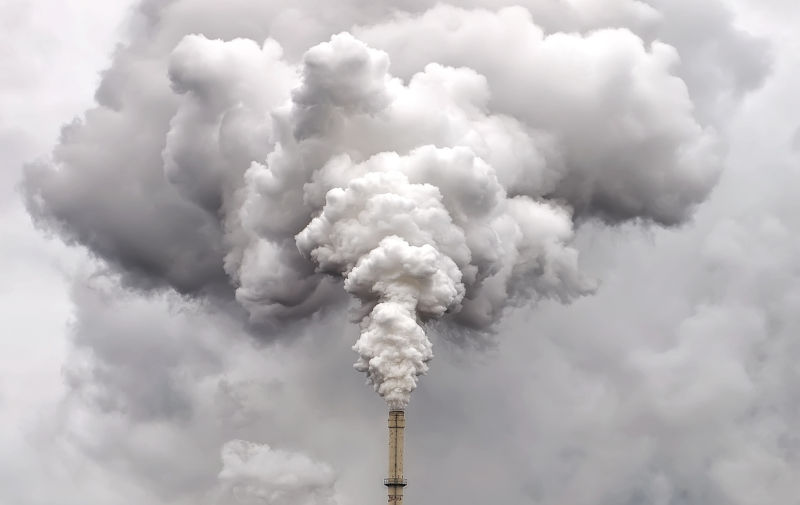Our carbon colonialism
July 17, 2023
On his way to Beijing to repair bilateral climate change relations John Kerry announced to the world the US would under no circumstances pay climate change reparations to the developing world. Why such a statement?
Some enterprising researchers help explain why by producing data which confirms the extent to which the Global North is responsible for the current excess of carbon emission. Their starting point is a surely justifiable assumption that CO2 should be regarded as a global common to be shared equitably among the worlds population. To work out a countrys rightful shares, they track carbon emissions over the period since the global North began industrialisation in 1850.
Taking the US, the EU, China and India as prime examples, in 2015 their percentage of global emissions based on GDP were around 15%, 10%, 29% and 7%. But calculations by academic Jason Hickel and colleagues show on a cumulative basis the picture is very different. The calculated share of emissions rises to 26% for the US and the UE 23%. For China it drops to 12% and India rates a mere 3%. More recent research (see Carbon Briefs) put the cumulative shares (1850 -2021) at 20% for the US, China 11% and India 3%. This provides no less a contrast with current annual emissions of 14% for the US, 29% for China, 17% for the EU and 7% for India.
If a per capita fair share basis is then introduced together with allowance for the effect on carbon emissions from trade, the size of the increase in the imbalance is startling and surely acutely worrying. Hickels now widely disseminated finding shows the global North (in this calculation the US, Europe, Israel, Canada, Japan, Australia and New Zealand) accounting for 92% of the evident dangerous rise in carbon emissions in 2015. That is, the emissions emitted over and above the accepted safe level of atmospheric CO2 - 350 ppm. The global south (the rest of the world including Latin America, Africa, the Middle East and Asia) accounted for a mere 8%. The US is shown to have overshot its rightful share by 40% and the EU by 30%. China still undershoots by 11% and India by an extraordinary 34%.
Carbon Trackers 2021 updated estimates of cumulative per capita shares do not radically change the picture. Per capita, Chinas cumulative share is 0.2 tonnes, the US 4.7 tonnes (second only to Canada) and Australias 3.8 tonnes (the worlds fourth highest). Thus, in 2021 four of the Norths top ten cumulative polluters - the US, Canada Russia and Japan accounting for only 10% of the worlds population owned 39% of cumulative emissions. By contrast four of the worlds most populous nations accounting for 42% of the worlds population China, India, Brazil and Indonesia - are not in the top ten and account for only 23% of cumulative emissions. Moreover, even on current non cumulative consumption levels, per capita emissions in China at 8.5 tonnes per capita remain well below the North top ten polluters 22 tonnes and the US 15.5 tonnes.
Underlining the extent and inexorable rise in the Norths unsustainable carbon consumption are measures of our consumption in material terms. Estimates are that high income countries over consumed a trillion of the total 2.5 trillion tonnes of material the globe consumed between 1970 -2017. Notably, Australia topped the per capital charts in this excess of consumption over the global average.

Academics such as Hickel point out that if the outsized consumption of the global north continues the carbon deficit can only grow as will the bill for climate change induced damage. Such is the perceived severity of the looming crisis Hickel now argues that to stay below 1.5c Northern countries need to adopt a path of zero growth thereby allowing the global South to sustain and catch up through positive growth. In the global North he argues, peoples welfare is to be protected by low carbon forms of consumption and redistribution of income from the ultra rich. Thats an unimaginably hard sell to governments of the global North whose economies are comprehensively dependent on capitalisms high octane fuel - growth. What government is going to fess up and tell its voters they are consuming too much and the business community that this excess consumption is a product of capitalism gone rogue?
Some economists such as US Nobel laureates Stiglitz and Krugman - argue there is no need for zero growth and find a comprehensive switch to low carbon green consumption would be sufficient. There is much room for debate here, but the uncontested bottom line is that these deficit studies give further compelling evidence we are consuming way beyond our sustainable means.
Unfortunately if we think that the only problem is the size of our inequitable consumption of global common carbon and materials we need to be promptly disabused. Such consumption has created an obvious downstream problem: that is, the clear evidence that the South is bearing most of the costs of climate change put by some reputable research at around 80%. That should be no surprise given these countries still heavy dependence on climate vulnerable agriculture and highly disturbed monsoon patterns. Of course the South which accommodates the worlds poorest is the least able to meet the financial burden of climate change. Estimates put the needed resource transfer to the South at around US1 trillion annually rising to US2.3 trillion by 2030.
Such sums are clearly on Kerrys mind at a time when the resource flow is barely one tenth of this sum. They have also been on the mind of President Macron who sponsored the recent Paris meeting of donors and recipients and designed to open up climate change financial flows from the global North to the South. The meeting was packed with global South heads of states: from the north Macron and Scholz the sole other heads. While the IMF stumped up a further $100 billion in drawing rights nothing near the needed huge financial transfers surfaced. It might be assumed that Northern leaders were home focussing on commitments to up expenditure on defence and the war in Ukraine rather than the war on climate change.
So what the North owes the South has been kicked down the road to COP 28 later this year. In this IPCC forum Kerrys semantical sensitivities are very much alive. At COP 27 an inordinate amount of time was spent on the naming a resource transfer fund - The Loss and Damage Fund to ensure North/South obligation was imputed.
The uncomfortable truth then is that without a dramatic increase in North /South financial flows the South will remain perilously undefended against the effects of climate change and least able to reduce their emissions. Equally, if we in the North make no adjustment to our consumption habits, we will miss holding to a 1.5C warming by an even larger margin that is currently in train.
Consequently, recognition of our carbon deficit should logically be a starting point for devising strategies which achieve an equitable, targeted reduction in carbon emissions. But in Australia and elsewhere in the North mention of the size of these deficits is studiously avoided by politicians and rarely, if ever, part of the public or even journalistic debate. To the contrary, any debate is too often interlaced with exhortations for China to do more. There are no explicit admissions I can find of our deficit by Australian governments - present or past - nor by any other Northern governments. Rather, we of the North hide behind our light annual carbon emissions with no evident desire to confront the social and economic cost to others let alone ourselves - of our outsized carbon deficits.
So we need to ask John Kerry if the use of the term reparations is barking up the wrong conceptual tree, what is the right one? What else is climate change aid to the South other than recompense for our massive past and continuing over consumption of the third worlds carbon commons? Is it not reparations for carbon colonialism?

